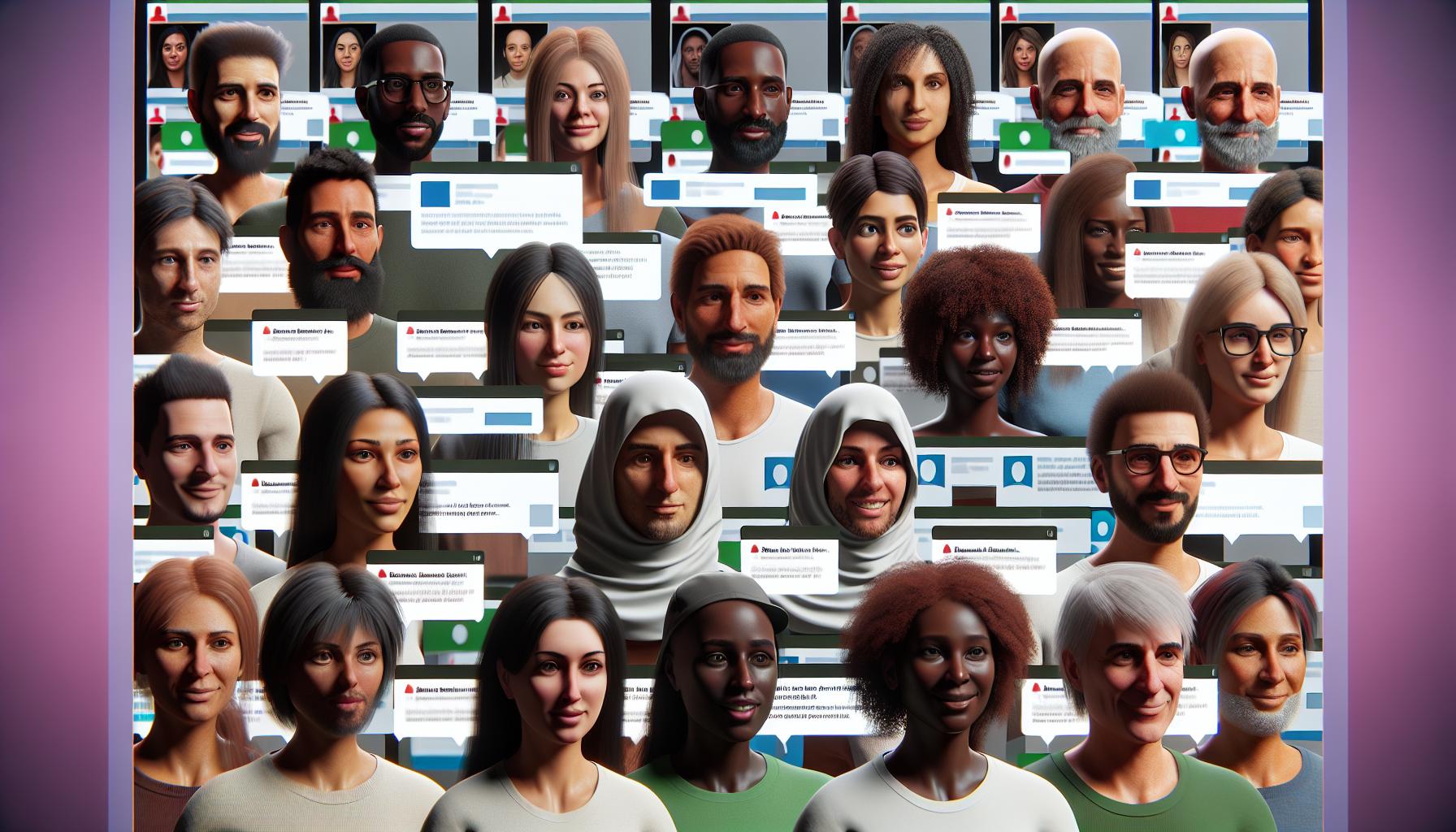Diving into the world of online communities, I’ve always been fascinated by the unique cultures they foster. One such intriguing corner of the internet is 4chan’s /soc/ board, a place where anonymity and social interaction collide. It’s a melting pot of personalities, where users from around the globe come together to share, connect, and sometimes clash.
On 4chan /soc/, you’ll find a wide array of threads dedicated to various interests and activities. Whether it’s meeting new people, sharing personal experiences, or exploring niche hobbies, there’s a sense of raw authenticity that’s hard to find elsewhere. The board’s lack of censorship and the anonymity it offers have shaped a distinct online culture that’s worth exploring.
Join me as I peel back the layers of this digital enigma. I’ll guide you through the social dynamics, the unwritten rules, and the allure that keeps users coming back to 4chan /soc/. It’s a journey into the heart of one of the internet’s most candid social landscapes.
The World of 4chan /soc/
Venturing into 4chan’s /soc/ board feels akin to stepping into an alternate digital universe where hierarchies and personal identities are cast aside for raw conversation. On this board, users unite over shared interests that range from the mundane to the exotic, creating a vibrant tapestry of human interaction.
One of /soc/’s most compelling aspects is the way it has become a repository for subcultures that, offline, might find it challenging to take root and thrive. It’s a realm where niche interests aren’t just explored but celebrated with an intensity that’s as intriguing as it is refreshing. For example, threads catering to collectors of rare memorabilia become digital hubs for trading, showcasing, and discussing these treasures.
As an avid explorer of online communities, I’ve noticed that the language on /soc/ can be abrupt, laden with internet slang and references that can seem impenetrable to the uninitiated. Users often share memes that are not only humorous but also serve as an inside language that cements their unity. It’s as though members wield these as badges of belonging, and they can be deeply revealing about the community’s values and humor.
What stands out about /soc/ is its self-policing nature. The community does a remarkable job of enforcing its own standards through a collective understanding of what’s acceptable, despite 4chan’s notorious resistance to formal moderation. I’ve observed threads where users swiftly challenge posts that veer off-topic or clash with the board’s ethos, reflecting an unspoken code of conduct.
To gain additional insights on the complexities of interaction within online communities, I often refer to leading resources like research from Pew Research Center, which provides a wealth of data on digital life. Another excellent source is Psychology Today, where experts dissect the nuanced ways humans connect and communicate online.
As a participant or observer within /soc/, you’re privy to an unfiltered slice of the internet that might feel disconcerting at first. Yet, for those curious enough to delve deeper, /soc/ presents an opportunity to witness a raw, undiluted form of community building that defies conventional social media landscapes.
Exploring the Unique Culture of /soc/
While digging deeper into 4chan’s /soc/ board, it’s evident that this corner of the internet is unlike any other social platform. Here, anonymity reigns supreme, encouraging a level of openness and authenticity not commonly found on mainstream social media. The board’s unique selling point is its raw, unfiltered snapshot of humanity, manifesting in a wide variety of threads dedicated to different interests and discussions.
What truly sets /soc/ apart are the spontaneous connections that spring forth between users. People drop into threads, leave a comment or image, and just like that, a conversation sparks. It’s a place where friendships, rivalries, and sometimes romances start with a single anonymous post.
Another aspect to consider is the language and humor that saturate /soc/. Sarcasm and wit blend with an array of inside jokes and memes, which might seem perplexing to newcomers. But for regulars, it’s the lingua franca, a way to swiftly identify in-group members. Speaking of memes, /soc/ has been a fertile ground for meme cultivation and propagation, some of which have found their way onto bigger platforms and into broader internet culture.
To understand the implications of such online behaviors and cultural norms, looking to expert studies can be enlightening. For instance, the Pew Research Center frequently publishes insights into how digital communities impact society, while Psychology Today offers a look into the psychological underpinnings of digital interactions.
Though free-flowing in its structure, it’s essential to note that /soc/ has a self-monitoring mechanism. Users quickly call out what they perceive as violations of the board’s culture, effectively moderating content without the need for formal authorities. This dynamic results in an ecosystem that can seem chaotic to outsiders but operates under a strict code understood by its participants.
The vibrancy of /soc/ lies in its ability to reflect various facets of the human condition, all from behind a veil of anonymity. It’s here that people share their deepest secrets, engage in heated debates, or simply seek out someone to talk to. The essence of /soc/ is in these daily interactions, each thread an exploration into the multifaceted nature of online communities.
Diverse Threads and Interests on /soc/
In my exploration of 4chan’s /soc/ board, I’ve discovered an astonishing variety of threads reflecting the diverse interests of its user base. From language learning to video game collaborations, the scope is nearly limitless. Users come together for hobbies like:
- Amateur photography
- Music sharing
- Fitness advice
Each thread becomes a micro-community, teeming with interaction and advice. Shared interests bond users who might never meet offline, yet here, they collaborate and share as if they have known each other for ages.
Music enthusiasts exchange rare tracks and discuss the latest industry trends. In photography threads, users critique each other’s work, fostering an environment of improvement and shared knowledge. Fitness gurus provide support alongside evidence-based advice, linking to reputable sources such as the Mayo Clinic or WebMD within the context of their conversations for those looking to enhance their health and lifestyle regimes.
The language used on /soc/ may sometimes be filled with jargon indicative of the board’s culture, but at its heart, it reflects a collective desire for connection, learning, and personal growth. There’s humor intertwined with serious discussions, a hallmark of the organic social interactions that naturally arise within /soc/.
As different as the topics may be, a commonality I’ve noted is the way these threads maintain the spontaneous connection I’ve previously mentioned. These aren’t just one-off discussions; they evolve over time, adapting to the users’ needs and current events. The flow of dialogue and shared moments keep the momentum of each thread alive, creating an ever-evolving tapestry of discourse ripe with the nuances of human expression.
Part of what makes these interactions so rich is the self-monitoring mechanism in play. Users aren’t shy about calling out behavior or posts that stray from the thread’s theme or the board’s ethos. It’s a self-sustained miniature society that mirrors the complex dynamics of real-world social groups, with all the quirks and characteristics that make human interaction so fascinating.
The Raw Authenticity of 4chan /soc/
When exploring the depths of 4chan’s /soc/, I’ve noted a stark contrast to the polished personas often curated on more mainstream social platforms. Here, there’s an unfiltered rawness, a sort of authentic spontaneity that’s becoming increasingly rare online. In the nooks and crannies of /soc/, you can stumble upon discussions that cover the most unorthodox topics, from niche hobbies to candid personal experiences. It’s this genuine characteristic that underlines the appeal of /soc/ for so many users seeking something beyond the edited and manicured profiles elsewhere.
Members of /soc/ aren’t bounded by the pressures of accruing likes or followers. Instead, they’re driven by a shared passion for genuine connection. Threads come to life at all hours, often spearheaded by those who adeptly juggle humor with insight, and in doing so, create a sense of community that’s as real as it gets. The unassuming nature of these interactions provides a digital space where vulnerability isn’t just tolerated but is often the norm.
On this board, anonymity plays a key role. It strips away the societal labels that often constrain us in the real world, allowing for a level of honesty that can be eye-opening. People feel free to express themselves without fear of judgment or repercussions, leading to threads that are equal parts enlightening and entertaining. The self-governance of the community itself is also notable, with users quickly calling out behavior that doesn’t align with the collective ethos.
Amidst the countless posts on fitness tips or amateur photography, there’s a recurring theme of self-improvement and mutual aid. Many users turn to /soc/ for constructive feedback on various life aspects, from career advice to personal dilemmas. It’s akin to a group of friends or even an impromptu support group, where the goal isn’t to impress but rather to engage and uplift.
Indeed, 4chan’s /soc/ board exemplifies the power of connection in an age where virtual ties can often seem shallow. The interactions within its virtual landscape are a reminder that behind every username and avatar, there’s a real person seeking out understanding and camaraderie. Despite being part of the larger and sometimes controversial 4chan community, /soc/ stands as a testament to the authentic human desire to connect and share with others without pretense.
Unveiling the Social Dynamics and Unwritten Rules of /soc/
Navigating the social dynamics of 4chan’s /soc/ board requires an understanding of its unspoken etiquette. Participation here hinges on a grasp of these unwritten codes, which have evolved organically from the collective user base. I’ve learned first-hand the value of maintaining anonimity, which is only occasionally lifted for meet-up threads or photo shares.
The art of conversation on /soc/ is rooted in tacit understanding. Posts that cross the line into personal attacks or overtly offensive comments are swiftly deemed unacceptable by the community. I’ve witnessed users enforce civility, showcasing that while the board might be free-wheeling in nature, respect is paramount.
Interaction on /soc/ extends beyond mere chit-chat. The threads often encourage personal growth and self-reflection. Helpful exchanges are commonplace, as experienced users offer advice to newcomers asking about various life situations. This peer-guided evolution is a staple of the community, reflecting a broader trend in the continual search for self-improvement.
Knowledge sharing on /soc/ is especially apparent in specialized threads. Many users come here seeking expertise that is hard to find elsewhere. Information on obscure hobbies or particular lifestyle choices is traded back and forth. My delve into these discussions has unearthed treasure troves of information, whether it’s about coding or homebrewing.
Joining /soc/ isn’t just about passive scrolling; it’s about contributing to an ever-evolving tapestry of human exchange. The expectation is that you bring something to the table—be it wisdom, humor, or empathy. It’s in these interactions that the true spirit of /soc/ shines through. On the surface, it may seem like another message board, but for those willing to engage, it’s a platform for meaningful connection and, at times, unexpected learning.
While mainstream coverage often portrays communities like /soc/ in a particular light, I’ve found that these depictions barely scratch the surface. The reality is that boards like these represent a complex weave of human interaction that defy simple categorization. For anyone diving into /soc/, be prepared to meet a diverse array of characters, each with their own quirks and backgrounds.
The Allure of 4chan /soc/
As I delve deeper into the world of 4chan /soc/, it’s crucial to shed light on the magnetic pull of this unique digital forum. Like a beacon for the curious and the nonconformist, /soc/ attracts individuals eager to explore the fringes of social networking, away from the polished and curated profiles of mainstream platforms.
Anonymity here isn’t just a feature; it’s a fundamental principle. It allows people to express themselves without the weight of a permanent digital footprint. This temporal quality, where today’s hot topic becomes tomorrow’s digital dust, provides a sense of freedom unfamiliar to heavily archived sites. With an ever-shifting landscape, users are drawn into lively and unpredictable discussions, which forms the backbone of /soc/’s allure.
What stands out on /soc/ is the authenticity that anonymity fosters. Without the pressure to maintain public personas, users can have honest exchanges, ranging from personal advice to more niche interests. These authentic dialogs are the lifeblood of the community, creating a space where individuals can connect based on shared passions and curiosities.
/soc/ also serves as a melting pot of cultures and perspectives. Here, global users chat, share experiences, and sometimes even find camaraderie. There’s a sense of egalitarianism in that everyone’s voice has the same weight – one isn’t more influential than another simply because of follower counts or social status. This digital egalitarianism anchors the community’s value system.
Participating in /soc/ is an exercise in networking without the network, if you will. It’s about building transient yet impactful connections where the focus is solely on the present exchange of ideas. Indeed, the most compelling aspect of /soc/ may just be the ephemeral relationships formed and the knowledge gained therein—underscored by a collective understanding that these interactions are both the means and the end of the community experience.
As with any community, there’s a wealth of informal knowledge to be discovered—tips on everything from privacy to platform etiquette. Experienced members often share insights, for instance, on navigating the site’s less intuitive features or best practices for maintaining one’s privacy online, which you can find more about on Electronic Frontier Foundation.
Conclusion
Diving into 4chan’s /soc/ has been an eye-opener for me. The board’s commitment to anonymity truly shapes the interactions and the community that thrives there. It’s a place where I’ve seen honesty flourish and knowledge shared freely, all without the constraints of a lasting digital identity. I’ve witnessed how /soc/ stands as a testament to the power of transient connections in our increasingly digital world. For those looking to explore the depths of internet culture and engage in candid discussions, /soc/ offers a unique and enlightening experience.
Frequently Asked Questions
What is 4chan’s /soc/ board and why is it unique?
4chan’s /soc/ board stands for “social” and is unique due to its foundation of anonymity. This board creates a space where users can express themselves freely, without the concern of a permanent digital identity, fostering genuine interactions based on shared interests.
How does anonymity impact the culture on /soc/?
Anonymity on /soc/ encourages a culture of authenticity, as users are more likely to engage in honest exchanges. Without personal information, conversations are centered on content and ideas, allowing for more open and uninhibited discussion.
What kind of connections can you make on /soc/?
Connections made on /soc/ are transient but impactful, rooted in shared passions and curiosities. The lack of permanent profiles means relationships are based on the exchange of ideas in the moment, not on past history or social status.
Why might someone be drawn to participate in /soc/?
Individuals may be drawn to participate in /soc/ out of curiosity and a desire to engage with a nonconformist community. The egalitarian nature of the board where every voice is equal appeals to those looking for a different social experience online.
Can you learn from the /soc/ community?
Yes, there is a wealth of informal knowledge on /soc/. Experienced members often share insights on a variety of topics, making it a resource for learning through dialogues and discussions in an ephemeral environment.



